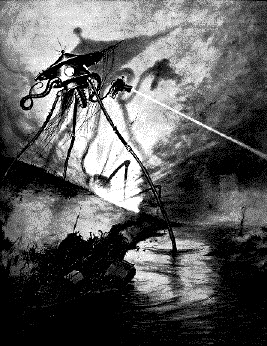Science Fiction
Fable from
The 19th Century
 The most remarkable and original historical prophecy of the age may well be that of Prince Odoevsky. In a series of dialogues written during the eighteen-
The most remarkable and original historical prophecy of the age may well be that of Prince Odoevsky. In a series of dialogues written during the eighteen-He published first in 1835, and then more fully in 1839 his picture of the future in a remarkable fantasy, The Year 4338. Appearing under the pseudonym of "the voiceless one," the story purports to be a series of letters written from Russia by a visiting Chinese student from "the chief school in Peking" in the year 4338.
The world has been divided between Russia and China. The historical calendar is now divided into three parts: from the creation of the world to the birth of Christ, from thence to the division of the world between these two powers, and from that time till the present. Little is even remembered of other countries or of history preceding the Russo-Chinese era. No one can read the few surviving lines of Goethe. The English long ago went bankrupt and sold their island to Russia at a public auction.
Russia is the cultural center of the world. Great new cities have been built, the weather transformed throughout the north, special aerial platforms, aerial hotels, and balloons fill the sky. The supreme sovereign of Russia is now a poet, who is aided by a "minister of reconciliation" and "philosophers of the first and second rank." Artificial lights are made from electricity; hostile impulses are deadened by "magnetic baths," in the course of which all secrets are revealed; communication is by magnetic telegraph; and marvelous, pliable synthetic products have been devised to provide every possible form of physical comfort. Love of humanity has become so great that all tragedy has been eliminated from literature.
A month is set aside for rest and relaxation at the beginning and middle of each year. There is a "continuous congress of the learned" to aid artists and scientists, and the capital is full of museums and gardens containing extinct curiosities, such as paper and animals.
China is not quite so advanced but is busy learning from Russia and has progressed rapidly in the five hundred years since "the great Khun-Gin awoke China at last from its long slumber, or rather, deathly stagnation." Without his leadership, China "would have been made over by now in the likeness of those unsociable Americans, who for lack of other speculative ventures, sell their cities on the public market, then come to us to expropriate. They are the only people in the whole world against whom we must maintain troops."
The only drawback to the picture as presented is that the subsidized scientists of this super-state have calculated that Halley's comet is about to hit the earth; and although people have already begun to move to the moon to help relieve overpopulation, no one seems able to devise a means of preventing this catastrophe.
An Interpretive History of Russian Culture
by James Billington.
Vintage Books (Random House), 1970